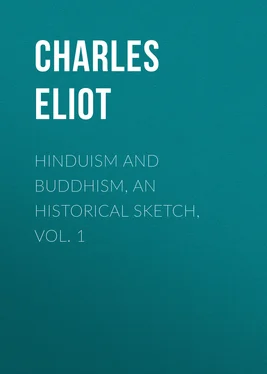Charles Eliot - Hinduism and Buddhism, An Historical Sketch, Vol. 1
Здесь есть возможность читать онлайн «Charles Eliot - Hinduism and Buddhism, An Historical Sketch, Vol. 1» — ознакомительный отрывок электронной книги совершенно бесплатно, а после прочтения отрывка купить полную версию. В некоторых случаях можно слушать аудио, скачать через торрент в формате fb2 и присутствует краткое содержание. Жанр: foreign_religion, Философия, Религиозная литература, foreign_psychology, foreign_antique, foreign_prose, на английском языке. Описание произведения, (предисловие) а так же отзывы посетителей доступны на портале библиотеки ЛибКат.
- Название:Hinduism and Buddhism, An Historical Sketch, Vol. 1
- Автор:
- Жанр:
- Год:неизвестен
- ISBN:нет данных
- Рейтинг книги:5 / 5. Голосов: 1
-
Избранное:Добавить в избранное
- Отзывы:
-
Ваша оценка:
- 100
- 1
- 2
- 3
- 4
- 5
Hinduism and Buddhism, An Historical Sketch, Vol. 1: краткое содержание, описание и аннотация
Предлагаем к чтению аннотацию, описание, краткое содержание или предисловие (зависит от того, что написал сам автор книги «Hinduism and Buddhism, An Historical Sketch, Vol. 1»). Если вы не нашли необходимую информацию о книге — напишите в комментариях, мы постараемся отыскать её.
Hinduism and Buddhism, An Historical Sketch, Vol. 1 — читать онлайн ознакомительный отрывок
Ниже представлен текст книги, разбитый по страницам. Система сохранения места последней прочитанной страницы, позволяет с удобством читать онлайн бесплатно книгу «Hinduism and Buddhism, An Historical Sketch, Vol. 1», без необходимости каждый раз заново искать на чём Вы остановились. Поставьте закладку, и сможете в любой момент перейти на страницу, на которой закончили чтение.
Интервал:
Закладка:
The doctrine of metempsychosis is also interesting as affecting the relations of men and animals. The popular European conception of "the beasts which perish" weakens the arguments for human immortality. For if the mind of a dog or chimpanzee contains no element which is immortal, the part of the human mind on which the claim to immortality can be based must be parlously small, since ex hypothesi sensation, volition, desire and the simpler forms of intelligence are not immortal. But in India where men have more charity and more philosophy this distinction is not drawn. The animating principle of men, animals and plants is regarded as one or at least similar, and even matter which we consider inanimate, such as water, is often considered to possess a soul. But though there is ample warrant in both Brahmanic and Buddhist literature for the idea that the soul may sink from a human to an animal form or vice versâ rise, and though one sometimes meets this belief in modern life 41 41 I know well-authenticated cases of Burmese and Indians thinking that the soul of a dead child had passed into an animal.
, yet it is not the most prominent aspect of metempsychosis in India and the beautiful precept of ahimsâ or not injuring living things is not, as Europeans imagine, founded on the fear of eating one's grandparents but rather on the humane and enlightened feeling that all life is one and that men who devour beasts are not much above the level of the beasts who devour one another. The feeling has grown stronger with time. In the Vedas animal sacrifices are prescribed and they are even now used in the worship of some deities. In the Epics the eating of meat is mentioned. But the doctrine that it is wrong to take animal life was definitely adopted by Buddhism and gained strength with its diffusion.
One obvious objection to all theories of rebirth is that we do not remember our previous existences and that, if they are connected by no thread of memory, they are for all practical purposes the existences of different people. But this want of memory affects not only past existences but the early phases of this existence. Does any one deny his existence as an infant or embryo because he cannot remember it 42 42 Or again, when I wake up in the morning I am conscious of my identity because innumerable circumstances remind me of the previous day. But if I wake up suddenly in the night with a toothache which leaves room for no thought or feeling except the feeling of pain, is the fact that I experience the pain in any way lessened if for the moment I do not know who or where I am?
? And if a wrong could be done to an infant the effects of which would not be felt for twenty years, could it be said to be no concern of the infant because the person who will suffer in twenty years time will have no recollection that he was that infant? And common opinion in Eastern Asia, not without occasional confirmation from Europe, denies the proposition that we cannot remember our former lives and asserts that those who take any pains to sharpen their spiritual faculties can remember them. The evidence for such recollection seems to me better than the evidence for most spiritualistic phenomena 43 43 I believe that a French savant, Colonel Rochas, has investigated in a scientific spirit cases in which hypnotized subjects profess to remember their former births and found that these recollections are as clear and coherent as any revelations about another world which have been made by Mrs Piper or other mediums. But I have not been able to obtain any of Col. Rochas's writings.
.
Another objection comes from the facts of heredity. On the whole we resemble our parents and ancestors in mind as well as in body. A child often seems to be an obvious product of its parents and not a being come from outside and from another life. This objection of course applies equally to the creation theory. If the soul is created by an act of God, there seems to be no reason why it should be like the parents, or, if he causes it to be like them, he is made responsible for sending children into the world with vicious natures. On the other hand if parents literally make a child, mind as well as body, there seems to be no reason why children should ever be unlike their parents, or brothers and sisters unlike one another, as they undoubtedly sometimes are. An Indian would say that a soul 44 44 I use the word soul merely for simplicity, but Buddhists and others might demur to this phraseology.
seeking rebirth carries with it certain potentialities of good and evil and can obtain embodiment only in a family offering the necessary conditions. Hence to some extent it is natural that the child should be like its parents. But the soul seeking rebirth is not completely fixed in form and stiff: it is hampered and limited by the results of its previous life, but in many respects it may be flexible and free, ready to vary in response to its new environment.
But there is a psychological and temperamental objection to the doctrine of rebirth, which goes to the root of the matter. Love of life and the desire to find a field of activity are so strong in most Europeans that it might be supposed that a theory offering an endless vista of new activities and new chances would be acceptable. But as a rule Europeans who discuss the question say that they do not relish this prospect. They may be willing to struggle until death, but they wish for repose—conscious repose of course—afterwards. The idea that one just dead has not entered into his rest, but is beginning another life with similar struggles and fleeting successes, similar sorrows and disappointments, is not satisfying and is almost shocking 45 45 But for a contrary view see Reincarnation, the Hope of the World by Irving S. Cooper. Even the Brihad Aran. Upan. (IV. 4. 3. 4) speaks of new births as new and more beautiful shapes which the soul fashions for itself as a goldsmith works a piece of gold.
. We do not like it, and not to like any particular view about the destinies of the soul is generally, but most illogically, considered a reason for rejecting it 46 46 The increase of the human population of this planet does not seem to me a serious argument against the doctrine of rebirth for animals, and the denizens of other worlds may be supplying an increasing number of souls competent to live as human beings.
.
12
It must not however be supposed that Hindus like the prospect of transmigration. On the contrary from the time of the Upanishads and the Buddha to the present day their religious ideal corresponding to salvation is emancipation and deliverance, deliverance from rebirth and from the bondage of desire which brings about rebirth. Now all Indian theories as to the nature of transmigration are in some way connected with the idea of Karma , that is the power of deeds done in past existences to condition or even to create future existences. Every deed done, whether good or bad, affects the character of the doer for a long while, so that to use a metaphor, the soul awaiting rebirth has a special shape, which is of its own making, and it can find re-embodiment only in a form into which that shape can squeeze.
These views of rebirth and karma have a moral value, for they teach that what a man gets depends on what he is or makes himself to be, and they avoid the difficulty of supposing that a benevolent creator can have given his creatures only one life with such strange and unmerited disproportion in their lots. Ordinary folk in the East hope that a life of virtue will secure them another life as happy beings on earth or perhaps in some heaven which, though not eternal, will still be long. But for many the higher ideal is renunciation of the world and a life of contemplative asceticism which will accumulate no karma so that after death the soul will pass not to another birth but to some higher and more mysterious state which is beyond birth and death. It is the prevalence of views like this which has given both Hinduism and Buddhism the reputation of being pessimistic and unpractical.
Читать дальшеИнтервал:
Закладка:
Похожие книги на «Hinduism and Buddhism, An Historical Sketch, Vol. 1»
Представляем Вашему вниманию похожие книги на «Hinduism and Buddhism, An Historical Sketch, Vol. 1» списком для выбора. Мы отобрали схожую по названию и смыслу литературу в надежде предоставить читателям больше вариантов отыскать новые, интересные, ещё непрочитанные произведения.
Обсуждение, отзывы о книге «Hinduism and Buddhism, An Historical Sketch, Vol. 1» и просто собственные мнения читателей. Оставьте ваши комментарии, напишите, что Вы думаете о произведении, его смысле или главных героях. Укажите что конкретно понравилось, а что нет, и почему Вы так считаете.












